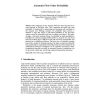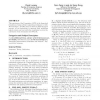249 search results - page 11 / 50 » Ten Theses on Logic Languages for the Semantic Web |
AGP
2003
IEEE
14 years 1 months ago
2003
IEEE
Abstract The Semantic Web (SW) can be seen as abstract representation and exchange of data and metadata. Metadata is given in terms of data mark-up and reference to shared, Web-acc...
KR
2004
Springer
14 years 2 months ago
2004
Springer
Practical description logic systems play an ever-growing role for knowledge representation and reasoning research even in distributed environments. In particular, the often-discus...
KBS
2007
13 years 8 months ago
2007
In this paper we study the brokering and matchmaking problem, that is, how a requester’s requirements and preferences can be matched against a set of offerings collected by a bro...
SEMWEB
2009
Springer
14 years 3 months ago
2009
Springer
Most languages for the Semantic Web have their logical basis in some fragment of first-order logic. Thus, integrating first-order logic with probability is fundamental for represen...
WWW
2005
ACM
14 years 9 months ago
2005
ACM
The correctness of the Z semantics of OWL is the theoretical foundation of using software engineering techniques to verify Web ontologies. As OWL and Z are based on different logi...


